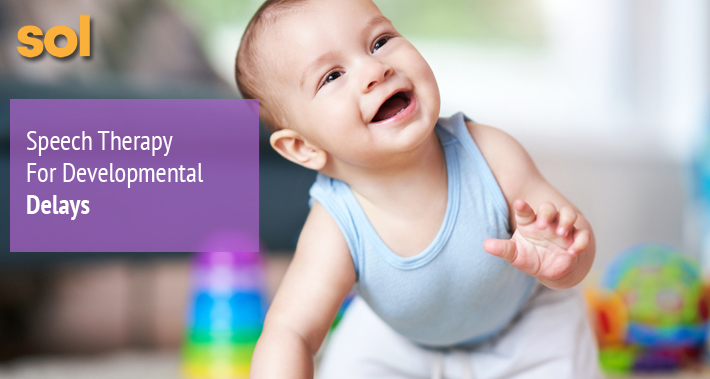
Are you concerned that your child isn’t reaching their speech development milestones?
Speech development milestones can be a helpful guide for you to use to assess how your child’s speaking ability is progressing.
If they’re falling a little behind, it’s not necessarily a cause for concern.
But, if they’re falling behind and no longer making noticeable progress, they could have a speech delay or developmental delay.
If you’re concerned that your child isn’t developing their speech at a typical rate, we can help.
At Sol Speech and Language Therapy, we provide speech therapy in central Texas, and have speech therapists with experience in pediatric speech therapy for developmental delays.
We offer both in person pediatric speech therapy, as well as speech teletherapy, to better fit your busy schedule.
Now, let’s find out more about speech development milestones and developmental delays.
What Speech Development Milestones Is Your Child Expected To Reach?
Speech development milestones were created as a general guideline that health professionals can use to monitor your child’s development.
If they’re falling too far behind, then they might need some extra help to reduce their risk of a speech delay.
By monitoring your child’s age appropriate speech development milestones, you can get an idea of how they’re progressing.
Keep reading to find out more about what speech development milestones look like for young children and what speech abilities they’re expected to reach by a certain age.
At Three Months Old
When your baby is three months old, they’re typically able to recognize your voice.
They may also:
- Smile when they see you
- Create different sounding cries for different needs
- Make cooing sounds when they see you or need something
At Six Months Old
When your baby is six months old, they’ll typically make some kind of sound when they’re being spoken to.
This may include:
- Babble and different noises
- Look at sounds and movement
- Indicate likes and dislikes with their voice
- Noticeably respond to your vocal changes
They will also pay more attention to music that they hear, or to toys that make particular sounds.
They may also gurgle happily while playing.
At One Year Old
When your baby is one year old, they’ll typically be able to:
- Speak simple words, like “mama” or “dada”
- Understand basic instructions, like “yes” or “no”
- Understand a basic vocabulary
- Turn to look towards sounds
At this stage, they’ll typically begin attempting to imitate the speech sounds that they hear and start to say simple words.
At Eighteen Months Old
When your child reaches eighteen months of age, they’re typically able to:
- Understand the names of people, objects, and body parts
- Follow simple commands given with gestures
- Say up to ten words
- Answer questions nonverbally
- Imitate simple sounds
At Two Years Old
When your child reaches two years old, they’re typically able to:
- Ask simple questions or speak simple phrases
- Follow and respond to basic commands and questions
- Speak clear enough to be understood most of the time
- Say around fifty words
What If My Child Is Falling Behind?
It’s natural to feel concern if you’re worried that your child may be falling behind.
Like we said before, every child develops at their own pace.
So, if your child is a couple of weeks behind in their milestones, but they are still progressing, then it’s likely nothing to worry about.
But, if they’re falling significantly behind and not showing any real progress, it could be a sign of an underlying condition that needs some extra help.
If this sounds like your child, it’s a good idea to speak to a pediatric speech therapist and express your concerns about a potential speech delay.
Remember, early intervention for your child’s speech delay can help them stay on track with their speech development and avoid falling behind or developing bad habits.
What Causes Speech Developmental Delays?
There are a number of things that could cause a speech delay.
Sometimes, there is a physical underlying issue that causes it.
For example, hearing loss can make it difficult for your child to learn speech.
If this happens before they begin speaking, it will often affect their tone and emphasis.
If it happens after they start speaking, they may experience a significant regression in their speaking ability.
In both cases, you’ll need to work with an audiologist and a speech therapist to help your child learn to communicate effectively.
RELATED: Getting A Better Understanding Of Sign Language
Other causes of speech developmental delays can include:
- Expressive language disorders
- Receptive language disorders
- Autism
- Intellectual or cognitive disability
- Cerebral palsy
- Childhood apraxia of speech
- Dysarthria
RELATED: Understanding The Different Types Of Speech Sound Disorders
However, the most common cause of a speech developmental delay is idiopathic.
This means that we don’t exactly know what causes it.
This is typically referred to as a general speech language delay, and is characterized by not meeting speech developmental milestones with no other apparent symptoms.
It’s often temporary and can be addressed with speech therapy that can occur both at home and in school.
The extra help often results in your child catching up quickly.

How Can Speech Therapy Help?
Speech therapy can help your child catch up and excel at their speech development milestones.
If you’re concerned that your child is falling behind, book an evaluation with us at Sol Speech and Language Therapy.
We’ll start with a comprehensive evaluation to determine your child’s strengths and weaknesses.
If possible, we will try to isolate the cause of the delay in order to build a custom treatment plan that will help them get caught up.
Early intervention is vital towards minimizing the potential effects of a speech delay on cognitive development.
The inability to communicate can have a serious, long lasting effect on your child’s academic and physical abilities.
It can even affect their ability to connect with the people around them.
Remember, depending on the cause of your child’s speech delay, it may not just go away on its own.
For example, with childhood apraxia of speech, children struggle to make the correct sounds for the right words.
It’s often very difficult to understand them.
This condition will not resolve on its own and often requires many sessions of speech therapy to be effective.
Another example is dysarthria, which is a condition caused by weakness in the muscles required for speaking.
Often, children with dysarthria speak slowly and slurred and are difficult to understand.
Your speech therapist will work with you and your child to understand their condition and create a tailored treatment plan to help improve their communication.
Again, without speech therapy, dysarthria will not resolve on its own.
Your child can’t grow out of it.
RELATED: Frequently Asked Questions About Speech & Language Therapy
Book Your Appointment With Sol Speech And Language Therapy Today
Speech therapy is an incredible tool to help your child catch up if they’re falling behind in their speech developmental milestones.
Remember, if you notice they’re falling behind, the sooner you have them evaluated by a professional, the better.
Speech and language delays in children are associated with difficulty reading, writing, socializing, and concentrating.
Each of these are important for academic performance, which sets them up for their future.
Starting speech therapy early can help minimize the impact of their delay and help them catch up sooner, which reduces the risk of experiencing academic difficulty.
Book your appointment with Sol Speech And Language Therapy today.
6448 E Hwy 290 Suite E-108,
Austin, TX 78723
(512) 368-9488
» https://g.page/r/CfRfhOpEQm7BEAE
Sol Speech & Language Therapy
555 Round Rock W Dr E-221,
Round Rock, TX 78681
(512) 808-3953
» https://g.page/r/Cb5pwCTosSEfEBM
Sol Speech & Language Therapy offers personalized skilled intervention to those struggling with their speech and language skills. Services offered include screening, consultation, and comprehensive evaluation. We also provide one-on-one and/or group therapy for speech sound disorders, receptive/expressive language delay/disorder, stuttering/cluttering, accent reduction, and much more.